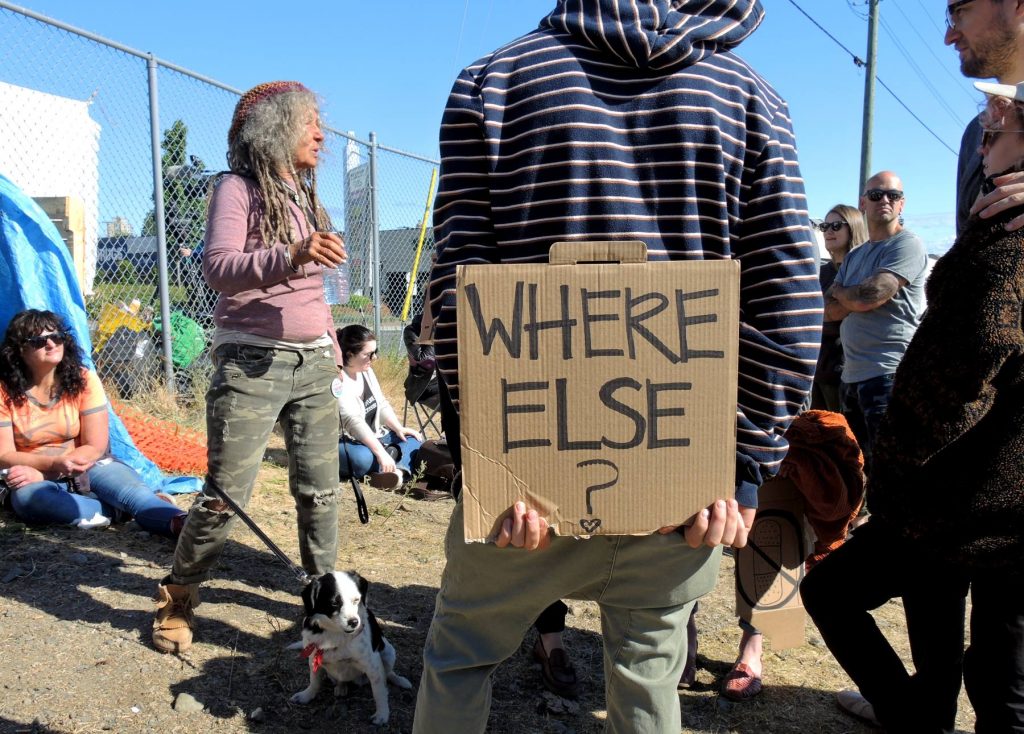
“We don’t have the right to be here but we have the power”
Solidarity beats a trespass order at Nanaimo’s Discontent City

The City of Nanaimo set the morning of Tuesday May 29th as the deadline to obey a trespass order they served to homeless campers at Discontent City. A statement issued with the order from Nanaimo City Council proclaimed that police would use “progressive action” to pressure homeless people to disappear back into the bushes of Vancouver Island’s second largest city. Many homeless residents of Discontent City were anxious because they have experienced police brutality, whether for ignoring such orders, or for simply trying to survive on the streets. To resist this worry, Discontent City called a support rally to defend the camp on the morning of the deadline.
More than 100 people showed up for this solidarity rally. Just before 9am, campers and supporters rallied near the front gate and pledged to stand together. A speaker yelled out to the group that although the police have the right to break up the camp, the number of people gathered together had the power to stay. The anxiety that individuals felt in anticipation of police violence was transformed by the collective power of supporters and tent city residents banding together. People in the crowd raised their fists and pledged to link arms and block the police from entering the camp if they dared try. And all together the crowd chanted “Homes Not Jails! Homes Not Police! Homes Not Displacement! Homes Not Hate!”
The 9am deadline came and went with no sign of the police. The crowd remained, worried, encouraged, and determined. People stood around and talked. Some took photos. And some campers talked with media.
I checked in with a worried-looking homeless man in his late 30s who had told me the day before that these two years are the longest he has been out of prison since he was 12 years old. When we were planning the protest, I asked him if he had ever been involved in a civil disobedience action before. He said, “no, but I have been in a couple riots. When I was 18 I was locked up in Ontario and there was a riot in my cell block. The guards came in with shields that went up almost to the ceiling. They were bent outwards into half circles so if they get you against a wall, it’s like being caught in a half-tube. One guard got me like that and tasered me through a hole in the shield,” he said.
“It was a super max prison and most of the guys were in there for life so the guards just beat us for fun and no one cared.” He said that experience shaped what he knows about police. I was concerned about how he might be doing, anticipating the police raid. He was standing out near the edge of the crowd. He looked at me with tears in his eyes, gestured to the crowd of homeless and housed people carrying signs that said things like “let them stay” and said, “this is moving.”
I think the solidarity rally against City Council’s trespass order shifted the power dynamics between Discontent City and the City of Nanaimo. In the 10 days since the camp was established, Council has certainly been inundated with bigot letters demanding they shut down the camp. One video posted on Facebook of a news conference at camp garnered 30,000 views within a few days and more than 1,000 comments – many of them hateful, including violent threats focused on women leaders of the camp.
City Council must have thought the camp was isolated and that smashing it would frighten off the homeless and be greeted with cheers. But the powerful solidarity rally at 9am on a Tuesday demonstrated the resilience, self-confidence, and militancy of the homeless campers, and also a surprisingly strong base of support amongst housed people in the working-class college town of Nanaimo.
The police never showed up to enforce the trespass order. Instead, in the afternoon, the camp’s lawyer received a message from the police. The RCMP’s regional commander had called in an outside negotiating force recently created to deal with contentious protests. The Nanaimo RCMP was not willing to negotiate with the camp but the “Division Liaison Team (DLT)” would sit down together and develop protocols. That afternoon, a representative from the DLT told camp police liaisons that the RCMP and Bylaw do not plan on enforcing the City’s trespass order.
During the first week of Discontent City, the biggest obstacle to the camp’s security and operation was the RCMP. Cowboy cops were constantly invading camp and harassing residents, harassment that continues daily that residents are increasingly deflecting through sheer numbers and growing confidence. The City’s trespass order felt like the culmination of the state’s efforts to smash the camp with direct intimidation and force.
But it turned out differently. The camp’s counter-rally, the determination of homeless people who courageously stood together and refused to run, and active solidarity from people who see in the camp a visible edge of their own struggles against the insecurities, poverty, and exploitation of life in a late-capitalist society – this power turned the moment of the City’s effort to smash the camp into the moment that made the camp impossible to move.
